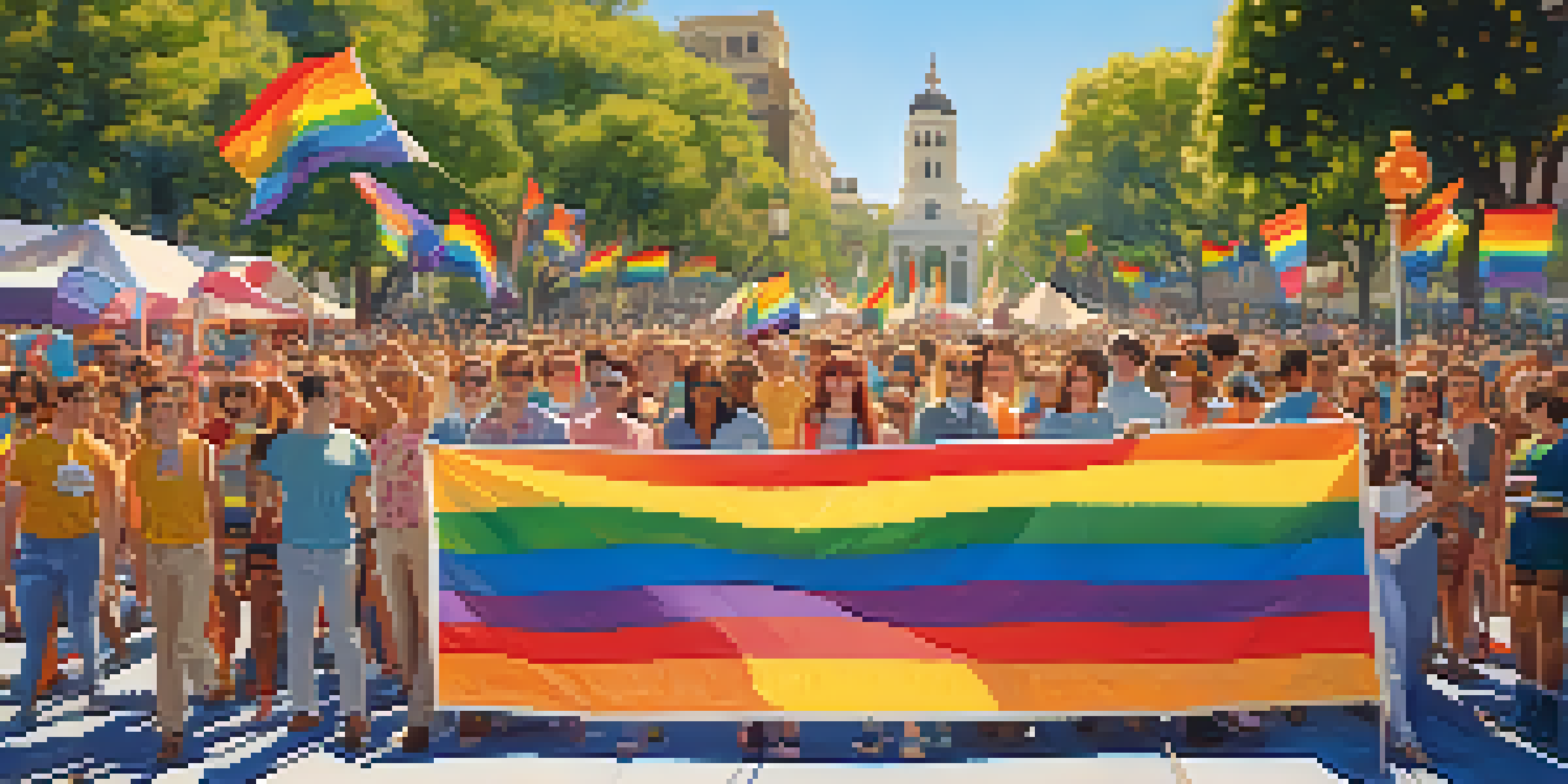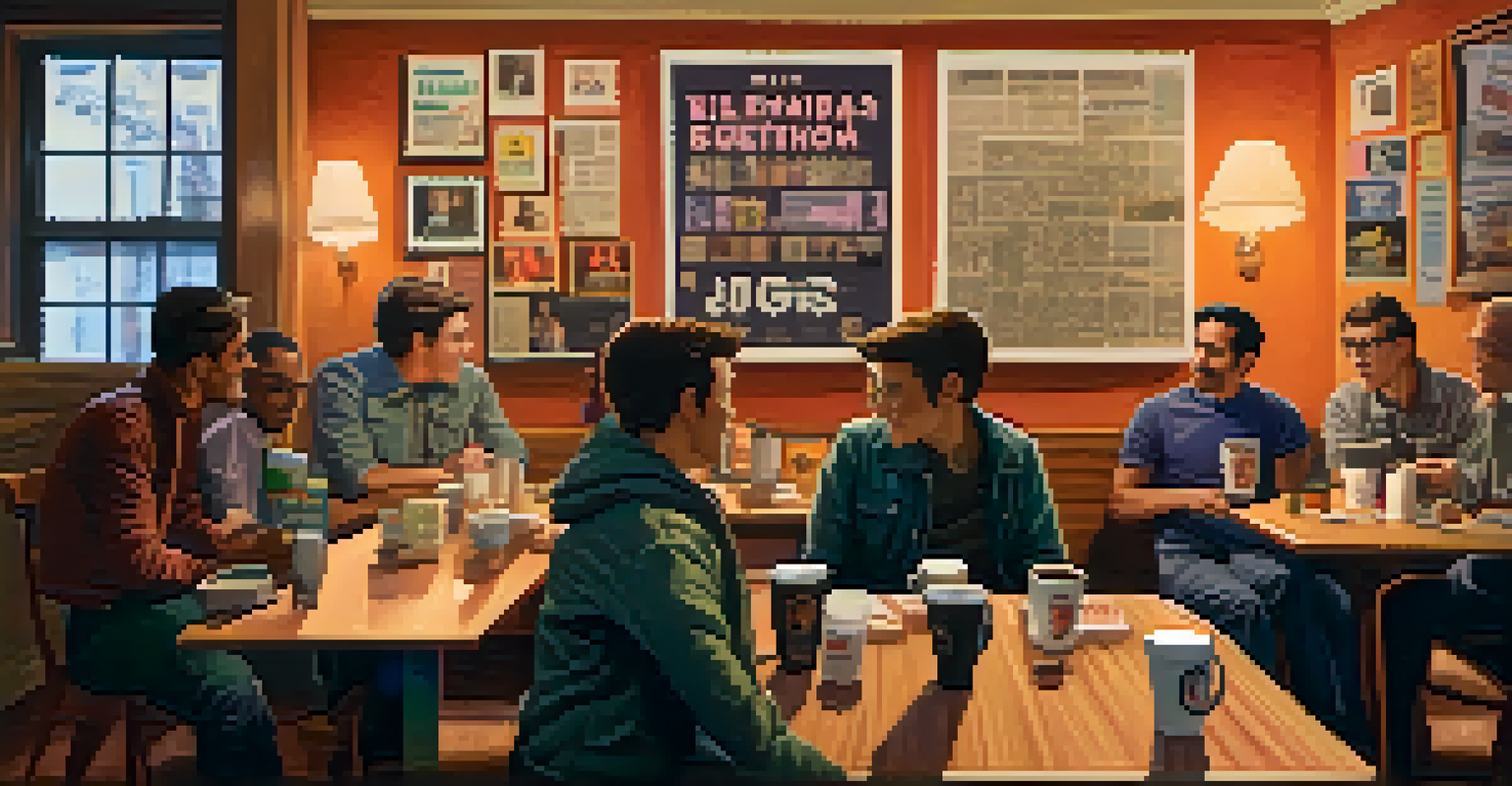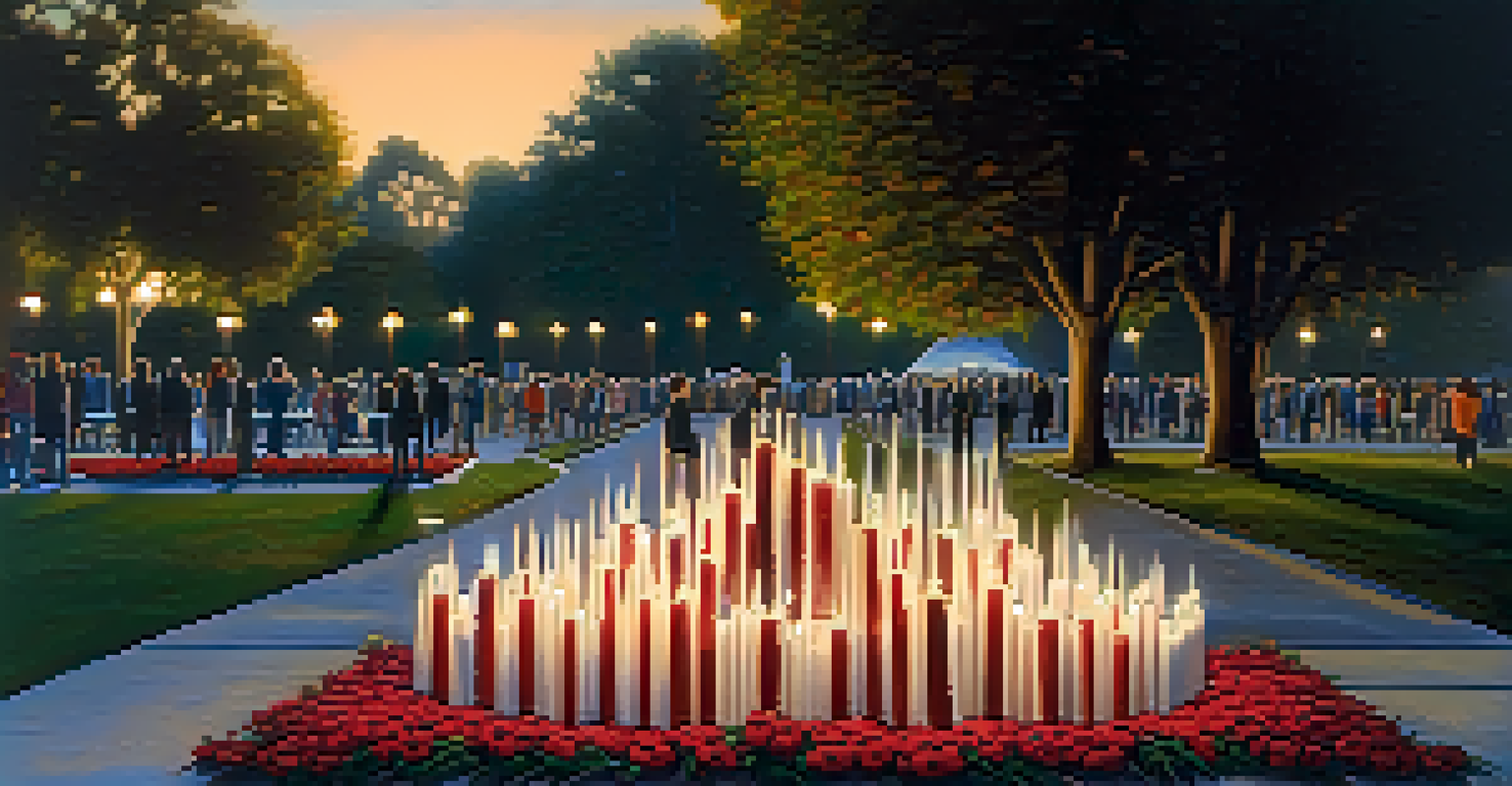Pasadena LGBTQ+ History: Notable Figures and Milestones

Early LGBTQ+ Presence in Pasadena: A Brief Overview
Pasadena's LGBTQ+ history stretches back to the early 20th century, with a vibrant community forming amidst societal challenges. While visibility was limited, underground gatherings and social clubs began to emerge, offering safe spaces for connection and expression. It was during this time that the seeds of activism were planted, setting the stage for future milestones.
Freedom is not worth having if it does not include the freedom to make mistakes.
As the city developed, so did its LGBTQ+ presence, with influential figures beginning to rise. These individuals not only contributed to the local culture but also advocated for change, challenging the norms of their time. Their stories highlight the resilience and determination within the community, paving the way for greater visibility.
The early days were marked by both celebration and struggle. Despite facing discrimination, the LGBTQ+ community in Pasadena found ways to thrive, often using art and performance as forms of expression. This rich tapestry of history showcases the strength of a community that has always sought acceptance and equality.
The 1960s: A Decade of Change and Activism
The 1960s marked a pivotal era for the LGBTQ+ community, coinciding with broader social movements across the United States. In Pasadena, activists began organizing, laying the groundwork for future advancements. Events like the Stonewall riots ignited a fire of activism, inspiring local leaders to push for rights and recognition.

Notable figures emerged during this decade, becoming champions for the community. They organized protests, marches, and gatherings that brought attention to the struggles faced by LGBTQ+ individuals. These early activists often faced backlash but remained undeterred, fueled by a desire for equality.
Early LGBTQ+ Activism in Pasadena
Pasadena's LGBTQ+ community began forming underground spaces for connection and activism in the early 20th century.
As a result of their efforts, the city began to see changes, albeit slowly. The 1960s were not just about fighting for rights; they were about building a sense of identity and solidarity within the community. This decade laid the foundation for the progress that would follow in the years to come.
The 1970s: Establishing Community and Visibility
The 1970s saw a surge in LGBTQ+ visibility, with Pasadena becoming a hub for community pride and activism. Local organizations began to form, providing resources and support for individuals seeking acceptance. Events such as pride parades and community festivals became more common, allowing people to celebrate their identities openly.
The most common way people give up their power is by thinking they don't have any.
During this decade, several notable figures emerged as leaders within the community, advocating for political rights and representation. They worked tirelessly to educate the public and dispel myths about LGBTQ+ individuals. Their dedication played a crucial role in changing hearts and minds across Pasadena.
The 1970s also marked a time of cultural expression, with art, music, and literature reflecting the diverse experiences of LGBTQ+ individuals. This flourishing of creativity not only celebrated diversity but also united the community in a shared mission for equality. The legacy of this decade continues to resonate today.
The 1980s: Confronting the AIDS Crisis
The 1980s brought unprecedented challenges to the LGBTQ+ community, particularly with the emergence of the AIDS crisis. Pasadena was not immune to this devastating epidemic, which claimed many lives and affected countless families. The community rallied together in response, showcasing the strength and resilience that defined this era.
Notable figures during this time emerged as advocates for healthcare access and support for those affected by AIDS. They worked to raise awareness, combat stigma, and provide resources for those in need. This activism was critical in shaping public perception and pushing for policy changes.
Impact of the AIDS Crisis
The 1980s AIDS crisis galvanized the LGBTQ+ community in Pasadena, prompting a surge in advocacy and support for affected individuals.
Additionally, the LGBTQ+ community in Pasadena found ways to honor those lost to the crisis through memorials and events. These acts of remembrance fostered a sense of solidarity and determination, reminding everyone of the importance of compassion and advocacy. The impact of the AIDS crisis continues to shape the community's narrative and activism today.
The 1990s: Expanding Rights and Acceptance
The 1990s marked a significant shift in societal attitudes towards the LGBTQ+ community, with increasing acceptance and advocacy for rights. Pasadena witnessed a wave of legislative changes aimed at protecting LGBTQ+ individuals from discrimination. This progress was fueled by the tireless work of activists who had paved the way over the previous decades.
During this time, organizations dedicated to LGBTQ+ rights flourished, providing support and resources to those in need. They played a crucial role in educating the public and fostering a sense of community. Notable figures continued to emerge, championing causes that would ultimately lead to greater equality.
The 1990s also saw the rise of Pride events, bringing the community together in celebration of diversity. These events not only highlighted the struggles faced by LGBTQ+ individuals but also showcased their contributions to society. The spirit of unity and pride established during this decade is still felt in Pasadena today.
The 2000s: Legal Advances and Continued Advocacy
The 2000s were a landmark decade for LGBTQ+ rights, with significant legal advancements taking place across the nation. In Pasadena, this era saw the fight for marriage equality gain momentum, with activists rallying for recognition and rights. The community came together in unprecedented ways, showcasing their determination for equality.
During this time, notable figures continued to lead the charge, advocating for policy changes at both local and national levels. Their efforts were instrumental in bringing attention to issues such as anti-discrimination laws and healthcare access for LGBTQ+ individuals. The collective voice of the community became louder and more impactful.
Progress in Rights and Acceptance
The 1990s and 2000s brought significant legal advancements and societal acceptance for LGBTQ+ individuals in Pasadena, culminating in the legalization of same-sex marriage.
As legal battles unfolded, Pasadena celebrated victories that had long been fought for. The 2000s were not just about winning rights; they were about building a future where LGBTQ+ individuals could live freely and authentically. The strides made during this decade laid the groundwork for future generations.
The 2010s: A New Era of Representation
The 2010s ushered in a new era of representation for the LGBTQ+ community, both in Pasadena and beyond. With the legalization of same-sex marriage in 2015, the community celebrated a monumental victory that symbolized years of hard work and dedication. This period marked a significant shift in societal attitudes toward LGBTQ+ individuals, fostering greater acceptance.
Notable figures from Pasadena emerged as influential voices in media, politics, and the arts, further amplifying the community's presence. These individuals not only broke barriers but also inspired others to embrace their identities. Their impact has been felt across generations, encouraging a culture of acceptance and pride.

The 2010s also saw an increase in intersectionality within the movement, recognizing the diverse experiences of LGBTQ+ individuals. The community became more inclusive, addressing the unique challenges faced by marginalized groups. This focus on representation continues to shape Pasadena's LGBTQ+ narrative, emphasizing the importance of unity in diversity.
Looking Ahead: The Future of Pasadena's LGBTQ+ Community
As we look to the future, Pasadena's LGBTQ+ community stands at the forefront of continued advocacy and progress. With a rich history of resilience and activism, the community is poised to tackle new challenges while celebrating their achievements. The lessons learned from past struggles serve as a guiding light for future generations.
Notable figures and organizations remain committed to advancing rights and fostering acceptance. They continue to engage the community through education, outreach, and events that promote understanding and inclusion. The legacy of activism is a powerful reminder of the importance of standing together for equality.
The future holds promise, with the potential for further advancements in LGBTQ+ rights and representation. As Pasadena embraces its diverse community, there is hope for a world where everyone can live authentically and without fear. The journey continues, fueled by the passion and dedication of those who came before.